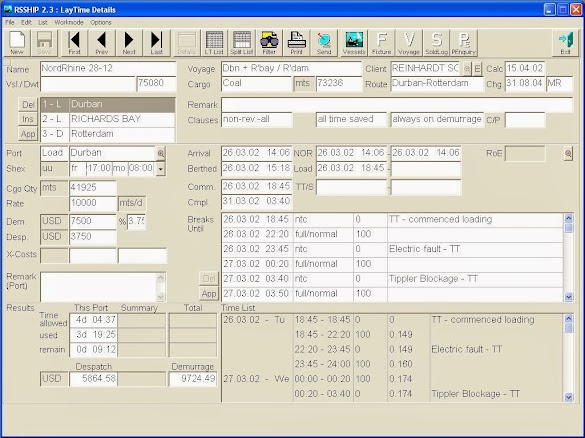One of the more mysterious elements of shipping law, at least to the uninitiated, are the issues of laytime and demurrage. I thought, for this reason, that it might be useful to do a 'bare bones' guide to the area. As with other areas identified many people use the terminology incorrectly so don't get confused by people saying apparently contradictory things.
This area of shipping law deals with the general principle that if you charter (hire) a ship to move cargo from A to B at a set price (i.e. a voyage charter), then you should pay the ship compensation if it gets held up whilst loading or discharging the cargo you wanted to move, i.e. if you delay in getting your goods to the port and the ship's journey takes 2 days longer as a result, you should compensate the ship for those 2 days lost. Here is the framework that has developed, in simple terms.
Ships are not like trains and cannot confirm absolute timetables for being in place A to B, especially when they are 'tramping' (just going where ordered next and not between set ports). So, when you enter a charterparty to hire a ship to move your goods the ship is given Laydays, being the period of days in which the ship can arrive to load your goods. After this point comes the Cancelling Date; if the ship is not there by this date the charterer may cancel the contract, basically because the ship is so late they either no longer wish to move the goods or wish to use another ship. This period is sometimes referred to altogether as the Laycan (Laydays + Cancelling).
When the ship arrives to load or discharge it tenders a Notice of Readiness (NOR) to the charterer, stating that they are ready to load / discharge. After a period of time (normally 6 hours) of giving notification it is considered reasonable for the charterers to have been able to start loading, so Layitme starts to run. Laytime is a period of time set out in the charterparty which gives the charterer an allowance for time to load (often 36 hours, but depends on trade and means of loading - oil tankers load faster than bulk cargo for instance). Once the charterers used up their laytime allowance time switches to Demurrage. Demurrage is a rate of compensation per day (or pro rata per hour) that they must pay to the shipowner for holding up the ship for longer than agreed.
If the ship is held up for reasons for which the charterer is responsible but outside the running of laytime / demurrage then the shipowner can sue the charterer for Detention. Usually the compensation awarded for detaining the ship is the same as the demurrage rate, because the parties have already agreed a convenient compensation calculation for using the ship's time outside the contract so it is easy for the courts to apply this rate.


